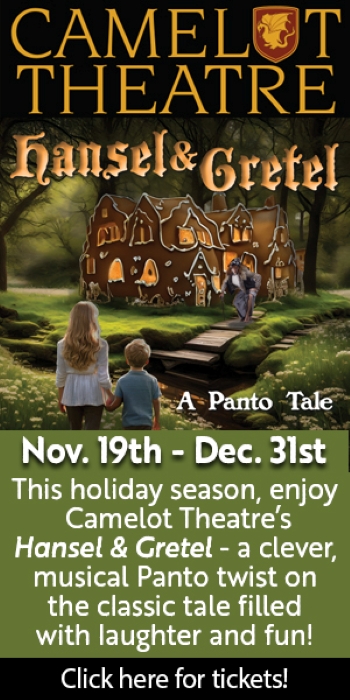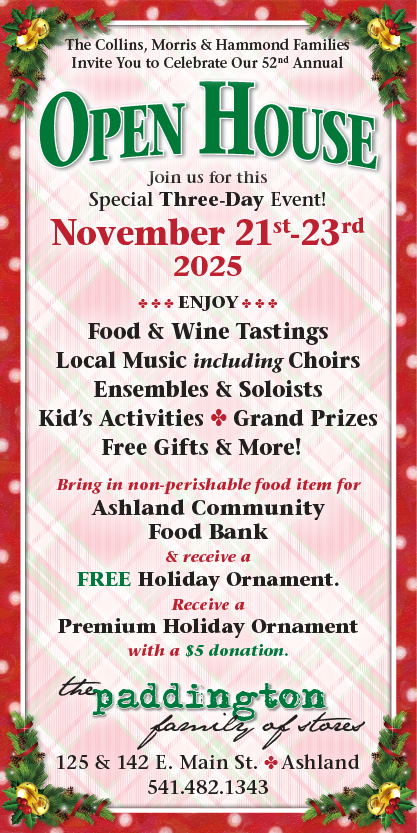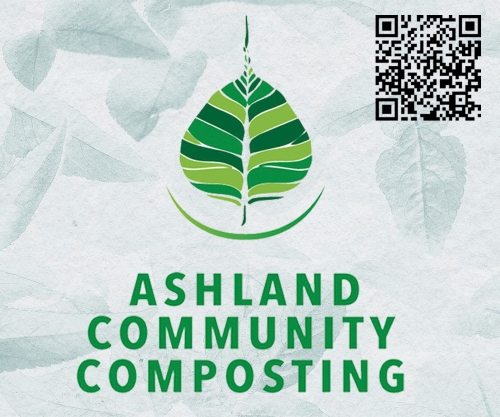Participants encouraged to invite others to future conversations
By Meg Wade for Ashland.news
At Carpenter Hall on Sunday, dozens of residents gathered to consider the nature of community and what it might look like to commit to fostering a sense of belonging in Ashland.
Hosted by All.Together.Now, the “Community Conversation” was billed as a follow-up to the well-attended lecture by john a. powell held in October.
Geneva Wiki, a citizen of the Yurok Nation who lives in Ashland and serves as Director of Belonging, Meaning, Well-Being and Purpose for the Aspen Institute’s Opportunity Youth Forum, opened with a recap of powell’s presentation. Wiki very briefly touching on concepts like othering and belonging, as well as powell’s description of “breaking,” “bridging,” and “bonding” — different ways of telling stories about connection or the lack of connection with others.
Wiki was followed by Mike Green of Common Ground Conversations, who framed present challenges to a sense of belonging in the context of the continuing legacy of the Civil War and the end of slavery in the United States. Green spoke to the challenges faced by the Radical Republicans during the era of Reconstruction.

After the war, “the Radicals had to change the conditions,” said Green. “There were 40 million refugees with no citizenship looking for a place of belonging.”
Eight generations later, our challenges are related but different, he suggested.
For Sunday’s purposes, Green said, “You don’t have to change the nation, the state, or the city. But you can change what’s in this room.”
The rest of the event aimed to be participatory in nature. Attendees were given tips on active listening and paired off to hear each other answer the question “What do you want Ashland’s story to be?”
They then broke into groups of 10, and seven circles around the room discussed the question “What does this community need to know?”

The question took as its premise that attendees were committing to forming a community dedicated to bridge-building and fostering belonging.
As each circle shared back to the whole group about their discussions, key themes included the need to map the resources available to bring to the effort; existing divisions in Ashland that fall along lines of income and age, and a wish to overcome them; the desire for everyone to feel a sense of safety and freedom to be themselves; and a question of who was not in the room, and how to best connect with them and understand what they need to feel a part of a broader community.
Many focused their remarks pertaining to the last question on the lack of representation of Ashland’s houseless residents among those in attendance, and the “othering” of those residents.

“We need to be honest about who we are and why we ‘other’ them [the houseless],” said Lisa Ebony Amador, while reporting on her group’s conversation. “Less than 24 hours after john a. powell showed up, we literally passed an ordinance with the word ‘exclusion’ in it.”
Amador was referencing the amendments to the Enhanced Law Enforcement Areas, or expulsion zones, passed by the City Council on Oct. 7.
Amador encouraged attendees to come and get acquainted with members of the houseless community at the free meal she and others hold from noon to 2 p.m. each Saturday at the Ashland Public Library. The meal is hosted as a potluck and those who can bring a contribution are encouraged to do so, but everyone is welcome to simply come and eat and get to know one another.
More questions had been planned for the group discussions, including “Who isn’t in the room that you want to be? Why aren’t they here?” and “What process of outreach could be created to gather marginalized voices?” While attendees were already beginning to address these topics, further consideration of each was cut short as the event ran over time.

Participants were encouraged to begin their own outreach by inviting others to future conversations to be hosted by All.Together.Now.
Not everyone was certain about this next step, or that such conversations would lead to change.
“Ashland sort of sections itself out,” commented Jacki Rosen, who said she had lived in many areas where diversity was more “front and center,” and people more easily related to one another across difference.
Rosen, who is multi-racial, said, “I walk into a room and people look at me in a certain kind of way, like ‘What are you doing here?’”
“I don’t know that I will see it change in my lifetime,” she continued. “I’m more concerned about the younger people.”

Join ‘a community of belonging‘
To receive further information about All.Together.Now, fill out a brief survey and sign up by clicking here.
A video of the original john a. powell (director of the Othering & Belonging Institute) event is available on YouTube.
Amador likewise remained skeptical after the event had finished.
“I came specifically to point out that conversation is not action,” she said. “It’s not fun to spin wheels.”
But for others, conversation that helps solidify the will to bridge with others across difference is a necessary first step.
“We’re looking first for a genuine commitment to building a community of belonging,” said Mike Green at the outset. “If we get that, alone, that’s monumental in 90 minutes.”
But Green agreed conversation was not the only goal. “How do we transform inspiration into actionable steps? That’s the next question.”
The All.Together.Now initiative, launched in October, involves dozens of community partners, including Ashland Together, the city of Ashland, Southern Oregon University, Ashland School District, Ashland.news, the Oregon Shakespeare Festival and Rogue Community Health.
Email Ashland resident and freelance journalist Meg Wade at [email protected].
Related story: Building a bigger ‘we’: Renowned civil rights expert john a. powell addresses packed Ashland audience at launch of ‘All.Together.Now’ (Oct. 9, 2025)




















